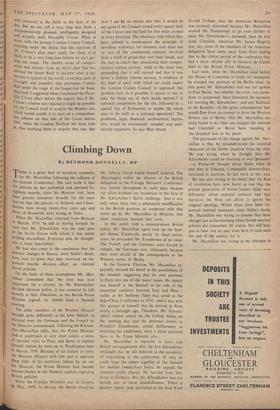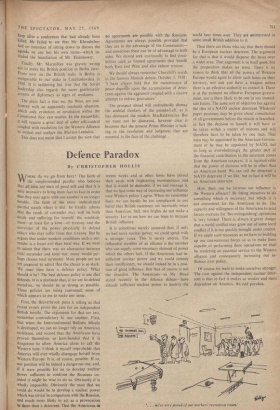Climbing Down
By DESMOND DONNELLY, MP THERE is a great deal of mistaken sympathy for Mr. Macmillan following the collapse of the Summit Conference. The real truth is that the policies he has embodied and pursued for eighteen months, since his Moscow visit, have been gravely mistaken--broadly for the same reasons that the policies of Baldwin and Cham- berlain were wrong twenty-five years ago and those of Roosevelt were wrong at Yalta.
When Mr. Macmillan returned from Moscow in March, 1959, he did so having formed the view that Mr. Khrushchev was the only man in the Soviet Union with whom it was worth holding discussions. Everyone else, he thought, was a mere functionary.
He had also come to the conclusion that the internal changes in Russia, since Stalin's death, were now so great that they exercised an im- Portant—maybe decisive—effect on external Soviet policies.
On the basis of these assumptions Mr. Mac- millan contended that the time was now opportune for a detente. As Mr. Khrushchev decided ultimate policy, it was essential to talk directly to him. Therefore, so the British Prime Minister argued. we should hold a Summit meeting.
The other members of the Western Alliance thought quite differently at the time. Indeed, so alartned were the Germans and the French by the Moscow communiqué, following the Khrush- chev-Macmillan talks, that the Prime Minister had to undertake, at very short notice, a series of hurried visits to Paris and Bonn to explain himself, before he went on to Washington later in March, 1959. Because of his failure to carry the Western Alliance with him and to appraise them fully of his intentions before he set out for Moscow, the Prime Minister had thereby created doubts in the Western capitals regarding British policies.
When the Foreign Ministers met in Geneva In May, 1959, to discuss the Berlin situation,
Mr. Selwyn Lloyd found himself isolated. The effectiveness within the alliance of the British delegation at the Foreign Ministers' Conference was limited throughout its early days because our allies doubted our resolution in the face of Mr. Khrushchev's Berlin challenge. And it was only when there was a substantial modification in the British position, as compared with that taken up by Mr. Macmillan in Moscow, that these suspicions became less overt.
At this point, with a watered-down British policy, Mr. Macmillan again took up the Sum- mit theme. Eventually, partly by sheer persis- tence, he persuaded Mr. Eisenhower of its value. The French and the Germans were forced to comply, the Germans very reluctantly because they were afraid of the consequences to the Western status in Berlin.
In the General Election Mr. Macmillan re- peatedly stressed his belief in the possibilities of the Summit, suggesting that his own presence in Paris was one of the major issues. He clearly saw himself at the Summit in the role of the important mediator between East and West— rather as Sir Anthony Eden had acted at the Indo-China Conference in 1954—and it was with this picture of himself that he arrived in Paris nearly a fortnight ago. Therefore, Mr. Khrush- chev's violent attack on the United States on the opening day and the personal insults to President Eisenhower, aimed deliberately at wrecking the conference, were a bitter personal blow to the Prime Minister also.
Mr. Macmillan is reported to have told British newspapermen after the first Khrushchev onslaught that he still believed in the possibility of negotiating at the conference. If only he could keep the others together at the Summit for another twenty-four hours, he argued, the situation might change. He hurried from Em- bassy to Embassy. But Mr. Khrushchev was not having any of these blandishments. There is another report, now published in the New York Herald Tribune, that the American delegation was seriously disturbed because Mr. Macmillan wanted Mr. Eisenhower to go even further to meet Mr. Khrushchev's demands than he had done. Certainly, whatever Mr. lames Hagerty may say, some of the members of the American delegation have come away from Paris feeling that in the critical period of the conference they had a more reliable ally in General de Gaulle than in the British Prime Minister.
Last week, when Mr. Macmillan came before the House of Commons to make his statement, he avoided any mention of the Berlin issue. At that point Mr. Khrushchev had not yet spoken in East Berlin; but whether the crisis was imme- diate or postponed. there remained the necessity for warning Mr. Khrushchev—and any Stalinists in the Kremlin--of the grave consequences that would flow from an attempt to drive the Western Powers out of Berlin. This Mr. Macmillan en- tirely failed to do. One can imagine the contrast had Churchill or Bevin been standing at the despatch box in his place.
The gravamen of the charge against Mr. Mac- millan is that he misunderstood the essential character of the Soviet situation from the start. He was wrong when he thought that Mr. Khrushchev could be charmed or was 4getatable' —as Roosevelt thought about Stalin when he met him at Teheran. Communist dictatorships, saturated in doctrine, do not work in this way.
He was also wrong in his belief that the fires of revolution have now burnt so low that the present generation of Soviet leaders think very differently about external contacts and that therefore the West can afford to ignore the original ideology. Whilst there have been im- portant internal easements since Stalin's death, Mr. Macmillan was wrong to assume that these changes are as far-reaching where Soviet external policies are concerned. Of course, this will hap- pen in time, but we may even have.to wait until the end. of the century for it.
Mr. Macmillan was wrong in his attempts to
keep alive a conference that had already been killed. He failed to see that Mr. Khrushchev had no intention of sitting down to discuss the agenda on any but his own terms—which in- cluded the humiliation of Mr. Eisenhower.
Finally, Mr. Macmillan was gravely wrong not to make the British position in Berlin, clear. From now on the British stake in Berlin is comparable to our stake in Czechoslovakia in 1938. It is saddening but true that the Soviet leadership also regards the more gentlemanly accents of diplomacy as signs of weakness.
The plain fact is that we, the West, are con- fronted with an apparently insoluble situation, which only evolution or revolution within the Communist bloc can resolve. In the meanwhile, it will require a great deal of sober self-control Coupled with resolution for the Western Alliance to outlast and outface the Marxist-Leninists.
This does not mean that I accept the view that no agreements are possible with the Russians. Agreements are always possible provided that they are to the advantage of the Communists— and sometimes these can be of advantage to both sides. We should seek continually to find possi- bilities such as limited agreements that benefit both East and West and also reduce tension.
We should always remember Churchill's words in the famous Munich debate, October 5, 1938: 'I have always held that the maintenance of peace depends upon the accumulation of deter- rents against the aggressor coupled -with a sincere attempt to redress grievances.'
The prospect ahead will undoubtedly dismay the wishful thinkers of the pseudo-Left, as it has dismayed the modern MacBaldwinites. But we must not be dismayed, however clear it becomes that the present Prime Minister is lack- ing in the resolution and judgment that are essential in the face of the challenge.







































 Previous page
Previous page